Malta’s demands for apertures has shifted from being almost a necessary afterthought so as to being able to offer a finished project, to one where now creativity, style, security and durability, and energy efficiency now form the heart of what people need from them.
Design & Build spoke to Dimech Apertures Ltd’s Managing Director Nigel Dimech, a second-generation artisan who had sufficient foresight to understand the shifting needs of the industry, and leverage improved technologies so as to steer a small family work-shop into becoming a flourishing organisation soon to move into a brand new factory in Corradino.
T hey say that the eyes are a window to the soul. Nigel Dimech’s eyes gleam when he speaks to you…of windows. Apertures of all sorts are what makes Nigel tick. “We started in 1984 in Lija. My father started the family business working apertures in iron” recalled Mr Dimech. As a young adult, he helped his father in the business where they also employed another skilled worker. Mr Dimech said that there was something in the business which made him tick. When his father decided to retire, for Nigel Dimech it was a no-brainer: he took over the reins without a blink.
Immediately, Nigel started making changes to the operations. Iron, a costly material both as ore as well as from an operational point of view, was giving way to aluminium. These were the 90’s after all and aluminium, first in silver and bronze and later anodised or sprayed into any colour imaginable, was making its mark in a Malta which was rapidly flourishing. At that time, aluminium was the cool metal, presentable and virtually maintenance free. But, as they say, scratch the surface and the problems start to show. “Aluminium scratches and once the paint or spray is scratched, the aperture remains marred” said Nigel Dimech. Furthermore, traditional aluminium -based installations did not provide adequate insulation. Thus began his search for more innovative and better products.
There is typically very little material which is not well-stocked
Beating aluminium’s practicality in this context had proved to be a challenge. Nigel’s searches were conducted in the halls of the international trade fairs. It was in these meccas of ideas and contacts that he was introduced to specialised plastic, thermal brake aluminium, and on combining these elements – as well as steel – with glass and wood . Plastic and apertures were, in Nigel’s mind at first hardly a match made in heaven. But Gealan changed his mind, to the point that Dimech Apertures’ Gealan PVC apertures are Nigel’s preferred solution for the vast majority of applications.
About PVC
This company had started operations in 1921 in a completely different line of business and by the mid-1950’s had expanded into plastics. In 1968 the first window profile was made and Gealan never looked back since. Nigel Dimech felt the same when he started contacts with this German company.
Nigel Dimech lists various pluses for working with PVC. “It does not scratch; it is durable and it is adaptable to different climates. PVC gives a guarantee of quality which aluminium does not,” ticks off Mr Dimech. And the difference is palpable. Where we think in one layer, Nigel Dimech thinks in multiple layers and compartments. A cross-section of a length of PVC aperture shows a honeycomb of compartments. “This is where the reinforcement comes in. The PVC is tough, but it needs to be strengthened through steel rods. These go into grooves within the frame” explained Mr Dimech.
Gealan requires all its appointed distributors to undergo certification every two years.
photo: Nigel Dimech proudly displaying Dimech Aperture’s current Gealan quality certification
It sounds simple. “Yes,” smiled Mr Dimech, “but it requires great skill. And Gealan makes sure that the standards are kept high, which is one of the reasons which so attracted me to this company. No chance of slacking – not acceptable to me and not acceptable to Gealan.” Indeed, Gealan requires all its appointed distributors to undergo certification every two years, to ensure that the factories operate to the necessary standards. Nigel Dimech looks on knowledge as a tool for providing a competitive edge. He proudly told us that “ Whilst training is obviously provided on site, a significant asset which Gealan provides is a training academy.” Nigel praised his multi-national work force’s skills; reinforced heftily via this mutual dedication to quality.
Mr Dimech sees a gap in the market for the skilled worker. “Today, those who make it academically go to university. This is not a bad thing in itself but it does leave a gap in the market for skilled workers. His troupe is a seasoned group which has swelled from the one employee of the 1980’s to 11 professionals – and soon to get stronger.
“We shall be moving to new premises in 2020,” smiled Mr Dimech appreciatively and with more than a hint of pride; justified, certainly, when one recalls that a small operation which started in the family garage thirty years ago will now be housed in a 700 sq m brand new establishment in Corradino.
it is about providing a flexible, easy to install system which lowers one’s installation costs
“New machinery, new premises and more employees to look forward to working with,” said Mr Dimech as his all-seeing eyes surveyed the workers beavering about on the shop floor. Their process, he explained, will thus be increasingly automated and efficiency will rise in tandem, “as will our ability to constantly deliver the highest quality product possible.” And Nigel certainly has none of the laid-back attitude which is so deadly to the growth of companies. He is a hands-on boss, a first among equals on the shop floor and this is also evident in the respect which the workers have for him not simply as a boss, but as someone who knows the job and has sweated with his employees. “I like to see a job started and completed. I dislike jobs being left half-finished or work carried out haphazardly,” said Mr Dimech, whose methodical nature rebels at anything which is not orderly. His care and attention is regularly tested, as are the skills of his workforce. Apart from the need to renew the Gealan certification every other year, the company also carries out random spot checks on Dimech Apertures’ clients to check not only the product but the client satisfaction. Enough to keep anyone on their toes.
The Process of Aperture Making
Nigel Dimech patiently took us through the processes of having an aperture made. First of all, there is the choice of material. Most material is in stock and stocks are kept to a considerable level so that the orders can be serviced within 5 to 6 weeks. “There is typically very little material which is not well-stocked, with the least popular elements on the market kept at minimal, workable quantities. The frames we install in Malta are exclusively those meant for severe weather, given the harsh sunlight and heat which the country is used to.”
photo: Gealan apertures being finalised on one of Dimech Apertures’ assembly lines
He continues to explain that there is the choice of single, double or triple glazing, and that “double glazing is the most popular installation since it not only helps in insulation, aided by UV filters, but also acts as a sound barrier, with the significant difference in price between double and tripe glazing not necessarily justifying the contained performance gains, but that between single and double-glazing giving high bang for your buck”.
The frames we install in Malta are exclusively those meant for severe weather
The process of an aperture: window, door, louvres, whatever is required both in commercial and residential premises, starts from the measurements. “Normally I go out to take the measurements and work out the quote,” said Mr Dimech. Precise work, painstaking work, for an orderly mind. And it has to be since a mistake in the measurements will result in chaos down the line; in an imprecisely finished installation. Mr Dimech explained: “And yet, when the quote is approved, it is inputted immediately into the computer. If there is a mistake in the measurements, the computer will catch on that, and the error is taken out of the equation.” He explained that the computer cuts the frames into the desired measurements so that the wastage is minimal.
When you look at the impressive lengths of meters and meters of framing, and then you are told that the computer makes the necessary adjustments so that in the final count, only circa 3cm are wasted, you can’t help being impressed. “This is where we also excel,” he explains: “our savings are passed onto the customer without forfeiting on quality.”
Dimech Apertures’ commitment to quality is evident in both its thermal break aluminium and its PVC-based installations alike.
Next comes the reinforcement. Steel rods, again computer cut, are inserted in their appropriate slot in the complex grooves which make up the heart of the PVC aperture. Next comes the welding. The frame sections are welded together to form a single bonded item and the seams are cleaned. “The cutting process is highly optimised, and the leftovers are sent abroad for recycling” said Nigel Dimech whose eagle eye is also turned on to the ecological aspect. Indeed, the new factory will also use green energy, solar, to be precise, so that the carbon footprint is reduced as much as possible.
Nigel Dimech looks to the future with optimism. He retains the role of project manager of the various jobs that Dimech Apertures is awarded, confident that his employees, highly experienced and skilled in PVC work, will do a great job. In spite of the fact that he is so happy to be working with Gealan, he travels abroad to fairs twice a year so that he keeps the company abreast of the latest developments on the market. Being ahead of the game is in his blood.
So, what’s next for Dimech Apertures? “Let’s get into our new premises first,” replied Nigel Dimech smilingly. And in his eyes, there is once more that knowing glint.
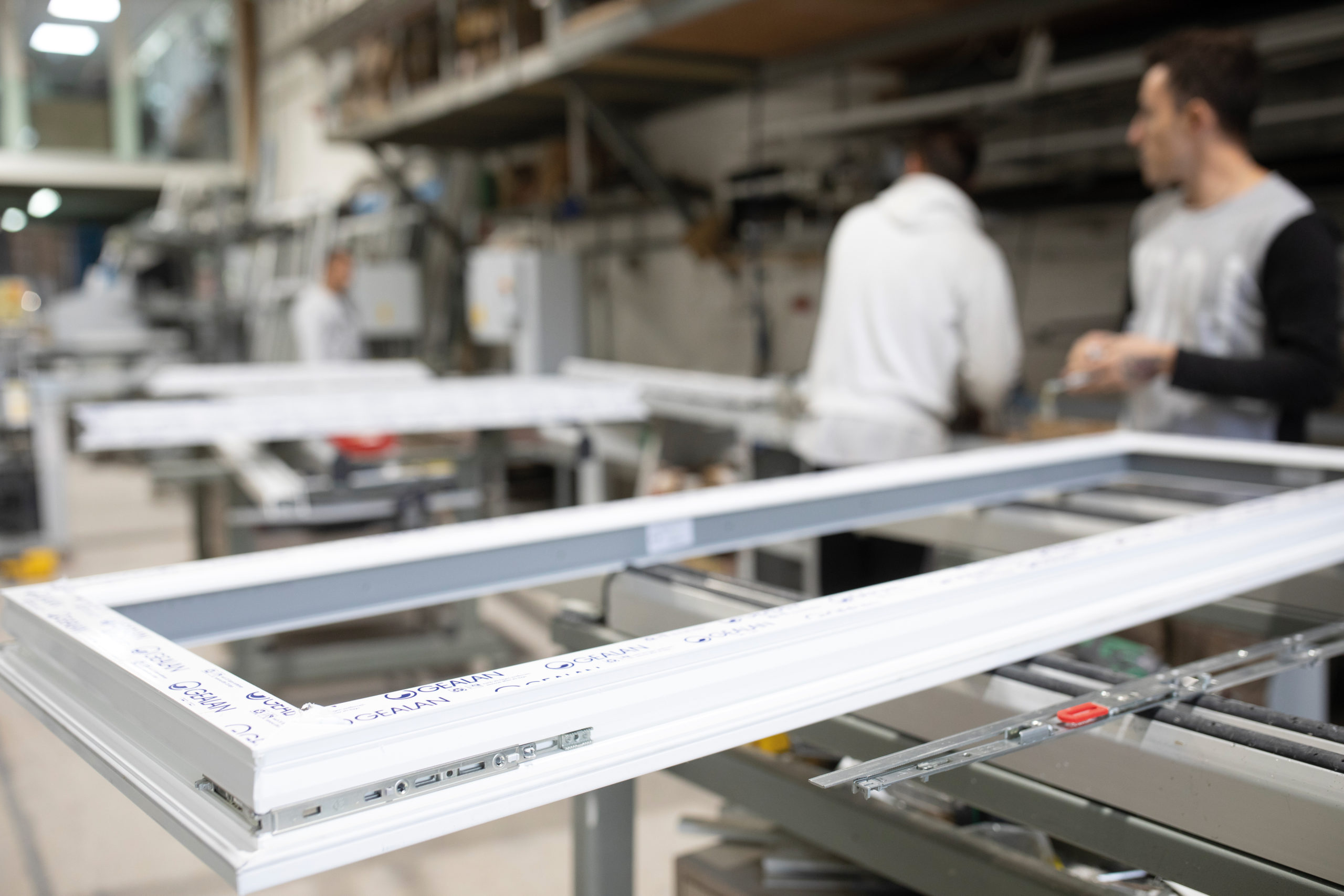
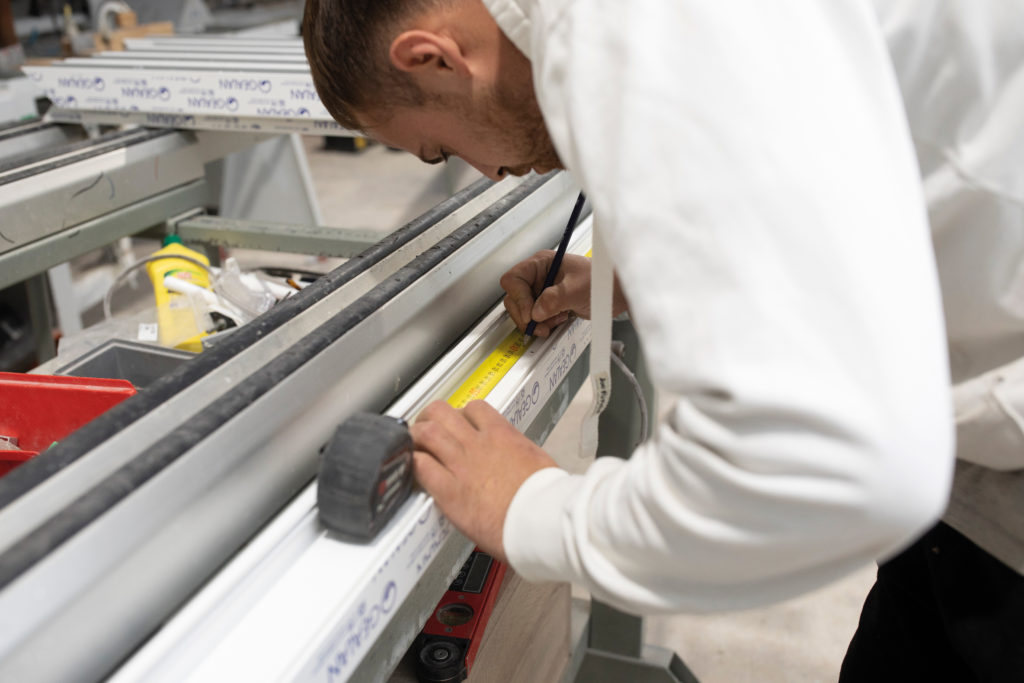
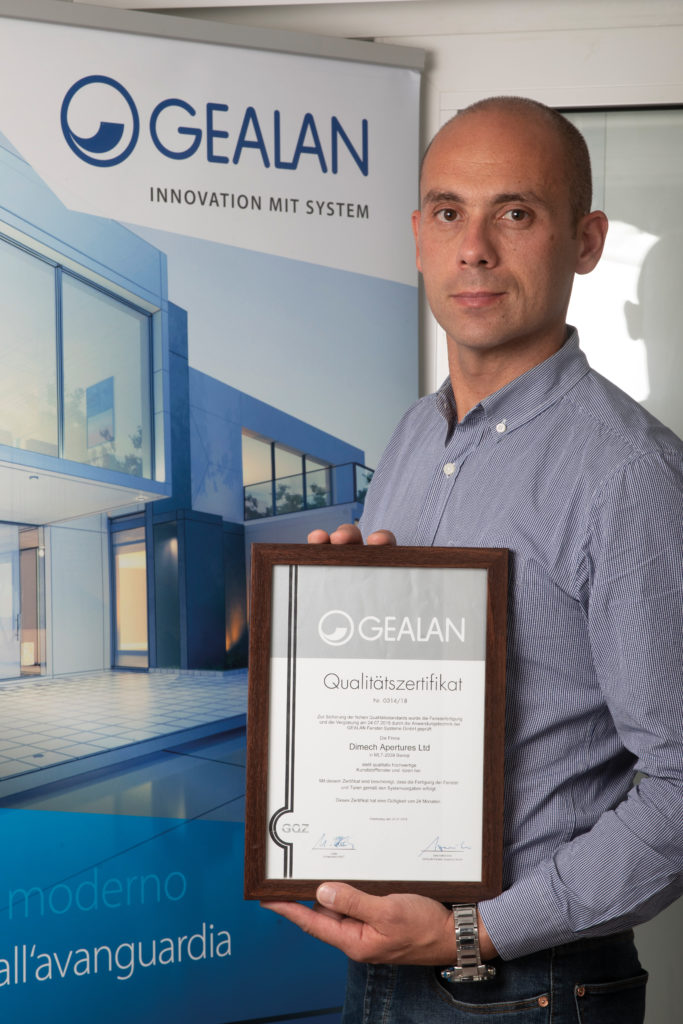
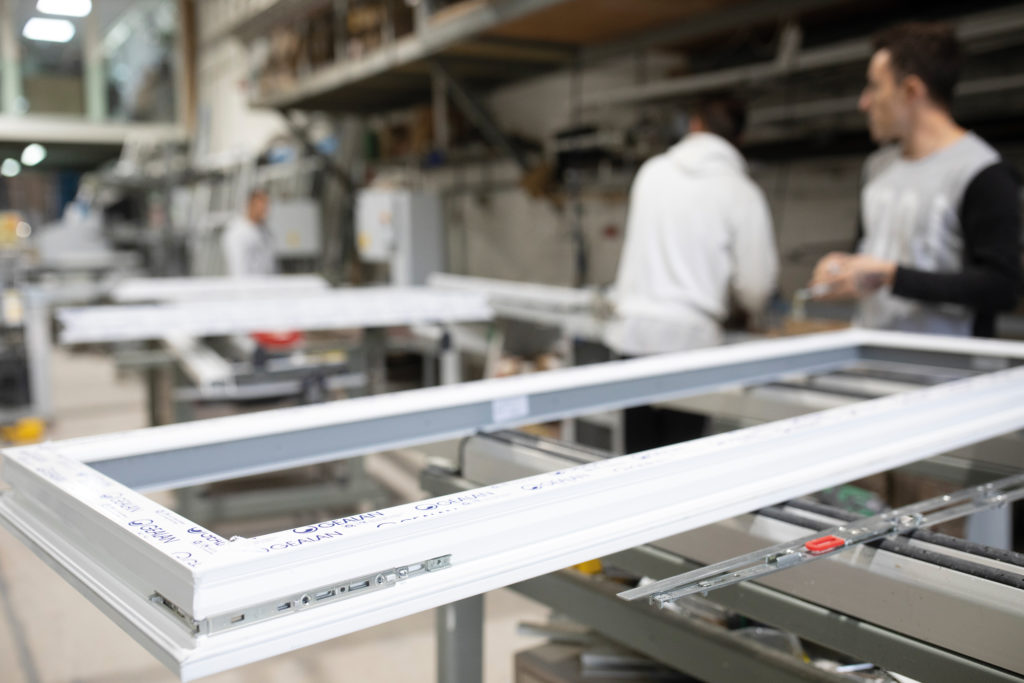
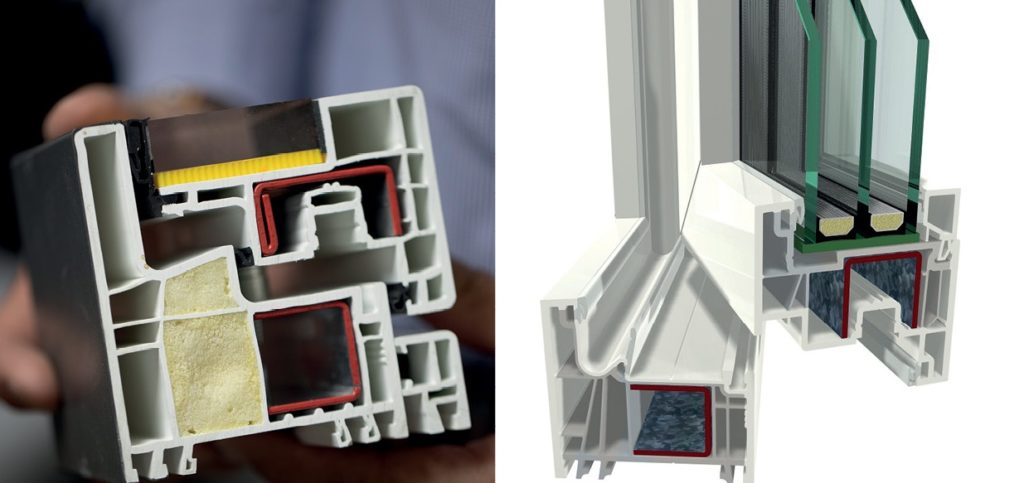
Comment